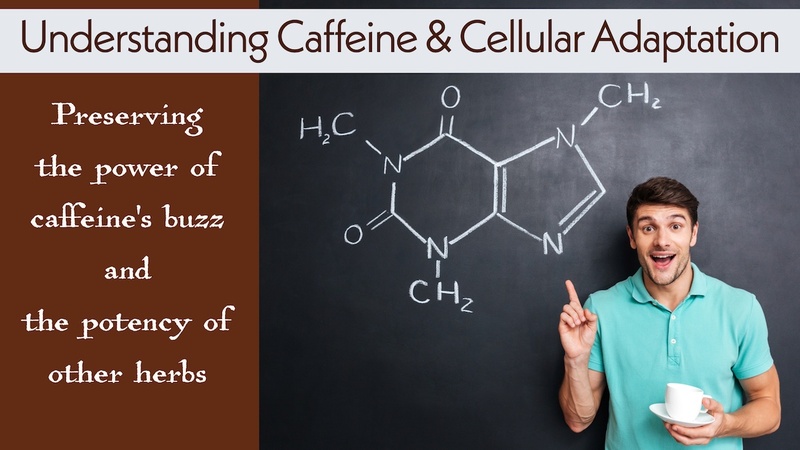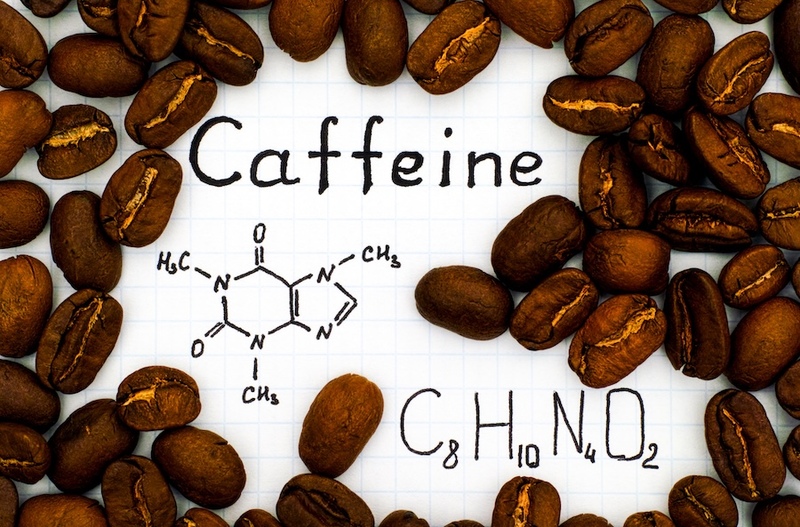
Caffeine is a mildly addictive alkaloid found in green and black tea, coffee, chocolate, kola nuts, guarana, yerba mate, and a few other lesser-known plants. Beverages made with these caffeine-containing plants are among the most widely consumed in the world. This makes it one of the most commonly used stimulants, with millions of people consuming it to feel energized and focused.
Most people can relate to the feeling of alertness or buzz that caffeine brings, but not everyone understands how it affects their body and why it becomes less effective over time. Understanding this will help you use caffeine wisely and give us insight into how to use other herbs effectively.
My Own Experiences with Caffeine

Growing up, my mother banned all drinks with caffeine in them; this included coffee, tea, and cola drinks. And even though I had my first taste of Coca-Cola when I was 19, I didn't start drinking Coke until I went to China in 1986 as part of a delegation from Nature’s Sunshine Products. There, I had the choice of drinking alcohol, tea, or Coca-Cola at most meals. And at the time, Coke seemed the most benign of the three, so I chose to drink that.
After spending three weeks in China and drinking cola every day, I was addicted to it, and when I got home, it took me nearly a month to get over craving it. Almost 15 years later, I tried coffee for the first time. It wasn’t plain coffee; it was a sugar-laden coffee drink, a Caramel Frappuccino from Starbucks. As someone who limited sugar intake and didn’t use caffeine, it really gave me a buzz. And after that, I started drinking coffee, primarily in the form of mocha, with increasing regularity.
Now, I’m one of the millions of people who drink a little coffee regularly, using it when I feel the need. However, I know that caffeine use can have a lasting impact on the body, which leads to my discussion of caffeine in general.
Understanding Caffeine
Many alkaloids interact with cellular receptors, altering cellular communication and body function. Caffeine’s primary mode of operation is its ability to mimic a molecule called adenosine. Adenosine has a brain-calming effect and helps signal fatigue and the need to rest. Caffeine attaches to adenosine receptors in the brain, which blocks the adenosine your body releases, masking your need for rest and recovery. Basically, caffeine blocks feelings of fatigue and reduces drowsiness.
In addition to inhibiting adenosine receptors, it up-regulates dopamine (the neurotransmitter involved in motivation and reward) and down-regulates GABA (the neurotransmitter that calms brain function, reducing anxiety and aiding sleep). The net effect is an increased feeling of energy and motivation, and improved concentration and focus.
Caffeine also affects the heart and bowels. It increases heart rate and blood pressure. And, it stimulates intestinal motility and can stimulate bowel elimination.
Adaptation and Addiction
 When regularly exposed to an alkaloid, like caffeine, that interacts with cellular communication, the body adapts to it. It will upregulate the detoxification systems that remove it and adjust the body’s signaling systems to compensate for its presence.
When regularly exposed to an alkaloid, like caffeine, that interacts with cellular communication, the body adapts to it. It will upregulate the detoxification systems that remove it and adjust the body’s signaling systems to compensate for its presence.
In the case of caffeine, it builds more adenosine receptors, thus bypassing the stimulating effects of the caffeine. So, if you drink one cup of coffee every day, after a couple of weeks, it will stop having a stimulating effect. Instead, you’ll have to have that cup of coffee daily to maintain normal energy levels.
To get the stimulus, the buzz, you’ll have to increase the dose, but the body will start to compensate for that, too. This happens with all plants and drug isolates that affect chemical messengers. This adaptation is the core of addiction, because that substance is now needed just to feel normal. If you stop using caffeine, for instance, you'll start to feel tired and sleepy. You may also get headaches from the drop in blood pressure and may even experience some constipation. These types of symptoms are what we mean by withdrawal.
Understanding this, I stop using caffeine when I have a few days off and want to relax. I feel more sleepy and wind up taking naps, but I think this is a good thing. It makes it so that when I do want to use caffeine again to stay alert while driving or working on a project, I still get the effect without increasing the dose.
Because caffeine lingers in your body long after initial consumption, and it interferes with your body's ability to feel calm and sleepy, it is wise to avoid consuming it later in the day. If possible, avoid drinking it 6 to 10 hours before you want to sleep.
Applications to Medicine and Herbs
Understanding what I’ve just explained about caffeine has some very practical applications to medicine and the use of herbs. For example, it explains why blood pressure medications stop working and doctors have to regularly switch prescriptions. The body adapts to the medication, and it requires a different medication to achieve the same effect.
Another example of the way the body adapts is how SSRIs affect serotonin levels. SSRIs will temporarily upregulate serotonin, thus increasing mood and feelings of confidence, but the effect eventually wears off as the body adapts, and if the person abruptly discontinues the medication, they can experience severe withdrawal.
This can also happen with herbs. If the herb is more of a tonic or nutritionally-based, it will restore the body to normal function after a few weeks or months, and you won’t need it anymore. If its action is more medicinal, it will work for a while and then stop, requiring an increased dose to maintain the effect. For example, this happens with stimulant laxatives like cascara sagrada. After a time, the body becomes dependent on them.
Caffeine Overdose and Energy Drinks
 If you don’t take a break from caffeinated beverages periodically and you’re trying to use them to increase energy, you’ll keep ramping up the dose until it reaches a level where you start to experience more and more of the negative effects. Excessive consumption of caffeinated beverages like coffee or energy drinks can contribute to insomnia, anxiety, high blood pressure, and other related problems.
If you don’t take a break from caffeinated beverages periodically and you’re trying to use them to increase energy, you’ll keep ramping up the dose until it reaches a level where you start to experience more and more of the negative effects. Excessive consumption of caffeinated beverages like coffee or energy drinks can contribute to insomnia, anxiety, high blood pressure, and other related problems.
I knew a lady who drank a pot of coffee every day and smoked cigarettes, another stimulant. She also took medication for insomnia, anxiety, and high blood pressure. So, on the one end, she was jacking up her nervous system with caffeine and nicotine, and on the other end, she was trying to calm it down with medications. This type of thing happens to way too many people who really don’t understand how the things they are doing are affecting them.
Energy drinks can be especially problematic because many of them use the isolated caffeine alkaloid instead of a plant extract. Extracts of plants like guarana, yerba mate, or coffee contain numerous other compounds that can modulate the effects of the stimulants. For example, both green tea and yerba mate also contain chemicals that can calm the nervous system, which means they provide some stimulation with a reduced tendency to anxiety and insomnia. I prefer whole plants as medicine instead of the isolated drug medications because their broader action tends to be less addictive and prone to side effects.
I'm thankful that my mom kept me from drinking caffeinated beverages until I was older, and I would also advise parents to avoid giving caffeinated beverages to children. This especially applies to energy drinks. Children don't need to become addicted to stimulants, and abuse of energy drinks by teenagers is a big problem.
The Value of Switching It Up
When I was first learning about herbs, several of my herbal mentors taught me to take periodic breaks from herbs and supplements. Ed Millet, for example, recommended taking a sabbath from your herb program by not taking anything one day a week. Other people suggested that you switch herbal formulas every four to six weeks. So, if you’ve been taking a nervine to aid sleep for a while, try a slightly different formula, and switch things up now and then.
I think that’s one of the reasons I seldom continue on any supplement for more than a few months and regularly switch up my supplement program. It’s also why I take breaks from caffeine consumption. I don’t feel like I should be dependent on anything. Switching things up or taking a break also gives me a chance to evaluate if something worked or if I still need help in that area.
I also think this advice applies to food. Native people were dependent on what nature provided in any given season of the year, so they regularly switched up the foods they ate. With modern grocery stores, people often eat the same foods all the time, seldom trying anything new. I think we’d all be healthier if we adjusted our diets seasonally and used a wider variety of foods.
I hope this discussion of caffeine has given you insights, not only into the appropriate use of herbs that act as stimulants, but also into using herbs more effectively in general.
I've already covered two of the most popular sources of caffeine: green and black tea and chocolate. And, in my next article, I'll be focusing on the specific uses of another, coffee.
Steven's Articles
-

-
Teasel
A traditional herb for healing bones and joints…
-

-
Barberry and Healthy Personal Boundaries
A thorny shrub for fighting infections and supporting…
December
-

-
The Evidence for Berberine
A yellow alkaloid found in traditional infection-fighting…
-

-
The Sensible Use of Caffeinated Herbs
Kola nuts, guarana, and yerba mate and other herbs…
-

-
The Health Benefits and Problems with Coffee
This popular caffeinated beverage can be beneficial…
October
-

-
Understanding Caffeine & Cellular Adaptation
Preserving the power of caffeine's buzz and the…
September
-

-
Horseradish
A pungent spice for aiding protein metabolism…
-

-
Banaba or Crepe Myrtle
A beautiful tree from Southeast Asia whose leaves…
August
-

-
Monkeyflowers
Flower essences to help see ourselves more clearly…
-

-
Mariposa Lilies
Strengthening the bond between mother and child…
-

-
The Noble Bay Leaf
A common kitchen herb for aiding digestion and…
-

-
Epimedium: Horny Goat Weed
A circulatory stimulant and kidney yang tonic…
July
-

-
The Medicinal and Nutritional Benefits of Apricots
A nutritious fruit and valuable medicinal seed for coughs
-

-
Dogwoods
Asian dogwood is used to stop excessive discharge,…
June
-

-
Neem: The Village Pharmacy
A popular Ayurvedic remedy for dental and immune…

